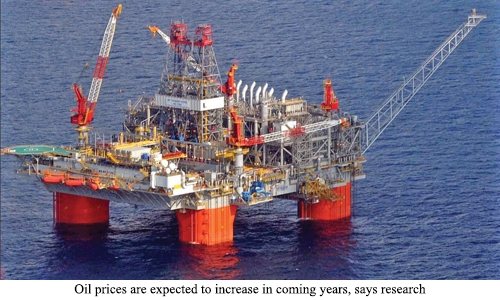OPEC will continue to dominate as oil price is expected to increase
Oil prices are expected to increase in the coming years due to fast-dwindling non-OPEC production, according to a recent research report by Bank of America Merrill Lynch (BoFA).
The study notes that only OPEC countries will have the capability to ramp up production in the short term to meet the expected 5.9 million barrels per day (b/d) jump in oil demand by 2020.
The present oversupply (against demand) in the market is in the tune of 1.8 million b/d and it has created huge price disruptions.
“With the market oversupply of 1.8 million b/d in 2015, OPEC needs to increase production by 4.1 million b/d in the next five years to ‘balance the market’. Of course, Saudi can make up for half of this given its 2.1 million b/d of spare capacity, and we believe it intends to at least increase its market share,” the report says.
Saudi Arabia’s oil minister Ali al-Naimi and other ministers in the Arab region, during a conference in Bahrain in November, had called for increased investments in oil sector, and had warned that the industry cannot afford to stop investments due to lower oil price.
Even though shale oil producers are considered much more flexible than their traditional counterparts, with a shorter investment cycle, a price above $55 per barrel is required for shale oil industry to be sustainable, and also, the bankruptcies caused due to the recent price drop will discourage lenders to finance the industry.
“Will shale production grow again at the same level as in the 2011-14 period? We are doubtful, even with a long-term WTI price estimate of $75/bbl (our base case). Rather, we believe that the damage done in the past 18 months to the shale investment cycle is sticky. As the shale industry is de facto highly levered, we believe future lenders will limit credit lines in a meaningful way, even when prices recover,” BoFA says.
The research note titled “Does OPEC have 2020 Vision?” says that the price decline will result in severe reduction in capital expenditure. It also expects maintenance capex to come down. The net effect will be that non-OPEC supply will come down by 2017.
Also, many projects initiated before the price crash has a break-even cost above the current oil price, and no enhancements to such projects are expected to be started until the spot price stabilises above $40. These factors are expected to help OPEC to garner more market share, it says.
Related Posts

